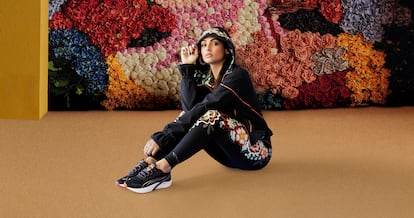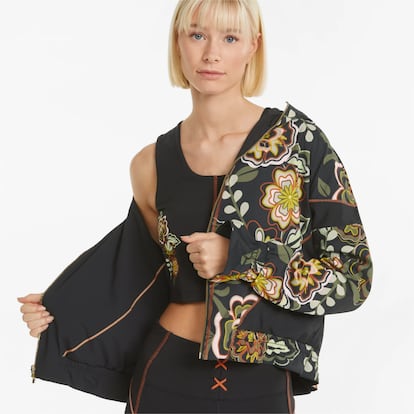Frida Kahlo’s family urges Puma to stop selling a collection inspired by the artist
The lawyers have threatened to sue Puma in Spanish courts if the campaign does not end

Frida Kahlo’s family has asked the Puma brand to take a sportswear collection inspired by the artist off the market. In a letter sent on Friday, July 22, the legal team representing Mara Romeo, the painter’s great-niece, gives the German firm seven days to stop promoting the garments. The lawyers have threatened to sue Puma in Spanish courts if the campaign does not end.
“We are obliged to request that you refrain from participating, directly or indirectly, in any commercial initiative that involves the use of the name or image of the painter Frida Kahlo,” says the letter signed by Alfonso Durán, representative of the artist’s family. The collection of sneakers, sweatshirts, t-shirts, leggings and accessories was launched in collaboration with the Frida Kahlo Corporation, a Panamanian company created in 2004 for the exploitation of trademarks associated with the name of Frida Kahlo.
Romeo, Frida Kahlo’s great-niece, has been involved in a legal dispute with the company for almost a decade. The artist’s descendent owns a 49% stake in the company. She accuses the company of having “systematically breached” the agreement signed after the creation of the company, while the corporation claims that the family “ceded all the present and future rights it had without any reservation.” Both parties accuse each other of wanting to “confuse people” and claim control of the brand.
In the letter sent on Friday, the team that represents Romeo warns Puma that they have filed at least two lawsuits, one in Panama and one in Spain, against the Frida Kahlo Corporation. In the first, the family requests precautionary measures and the appointment of “a judicial administration” charged with defending their interests. In the second, which has already been admitted for processing in Barcelona, the lawyers request the “nullification of any association or co-production agreement” with the Frida Kahlo Corporation “in relation to the improper use of the image and name” of the painter.
“If in the course of the next seven days, you do not formally notify us of your decision to definitively withdraw from the promotion (...) we will proceed without further ado to expand the lawsuit against you,” says the letter sent to Puma. A spokesperson for the German brand has told EL PAÍS that the company does not wish to comment on the claim.

The Panamanian company wrote in an email to this newspaper that “the class of products and services for the registration of trademarks that corresponds to and protects the Puma collection is class 25.” “Frida Kahlo Corporation is the owner of said registry,” says a spokesperson for the majority shareholder, who accuses the family of wanting to create “media conflicts” and denies the “illicit exploitation of their heritage.” “Instead of supporting the work of the Frida Kahlo Corporation to generate interest in the artist’s art and legacy, the heiresses have misled many by saying that they own the rights assigned to the Frida Kahlo Corporation,” she says.
The collection is part of Puma’s She Moves Us initiative, which focuses on female empowerment. “Frida’s artwork and culture illustrate a story of female empowerment and independence,” reads Puma’s website, which also explains that the collection “elevates style and purpose through technical designs and powerful mantras.” It consists of black, olive green and light green garments with embroidered flowers.
In 2018, the family took a similar action against Mattel to stop the marketing of a Frida Kahlo-inspired Barbie doll, a slender figure with braids, dressed in a black shirt, blue skirt and red shawl. Sales were suspended in Mexico, although the doll, a limited edition, sold out in the rest of the world.
Tu suscripción se está usando en otro dispositivo
¿Quieres añadir otro usuario a tu suscripción?
Si continúas leyendo en este dispositivo, no se podrá leer en el otro.
FlechaTu suscripción se está usando en otro dispositivo y solo puedes acceder a EL PAÍS desde un dispositivo a la vez.
Si quieres compartir tu cuenta, cambia tu suscripción a la modalidad Premium, así podrás añadir otro usuario. Cada uno accederá con su propia cuenta de email, lo que os permitirá personalizar vuestra experiencia en EL PAÍS.
¿Tienes una suscripción de empresa? Accede aquí para contratar más cuentas.
En el caso de no saber quién está usando tu cuenta, te recomendamos cambiar tu contraseña aquí.
Si decides continuar compartiendo tu cuenta, este mensaje se mostrará en tu dispositivo y en el de la otra persona que está usando tu cuenta de forma indefinida, afectando a tu experiencia de lectura. Puedes consultar aquí los términos y condiciones de la suscripción digital.








































